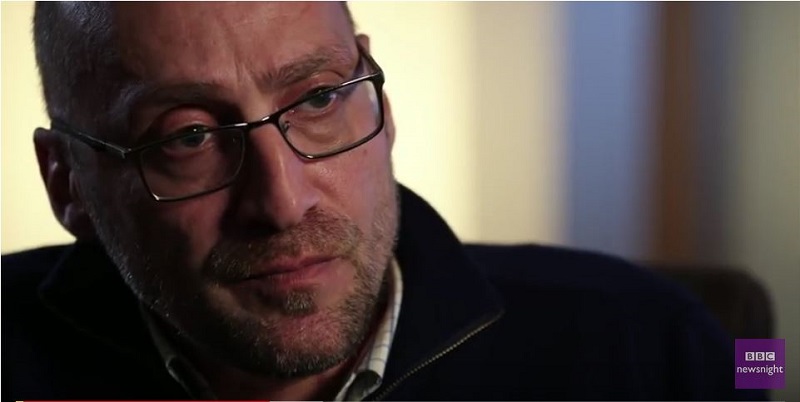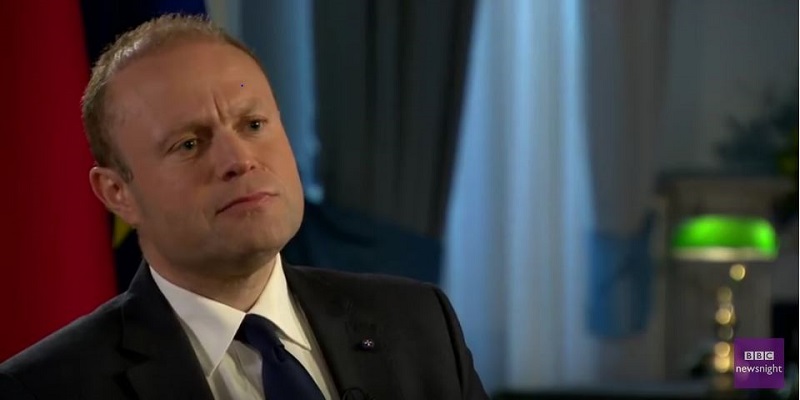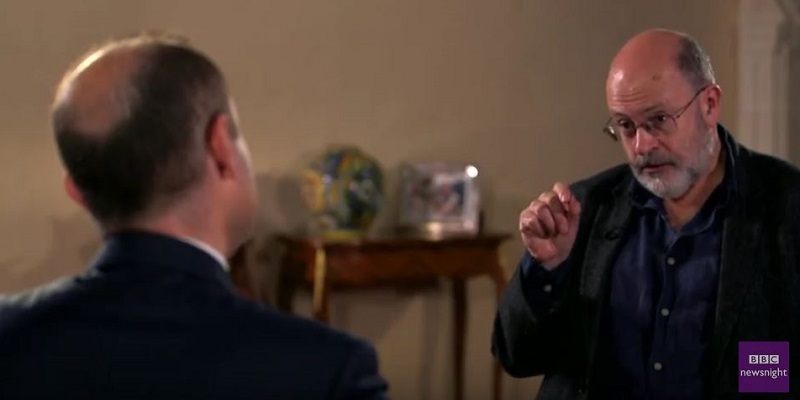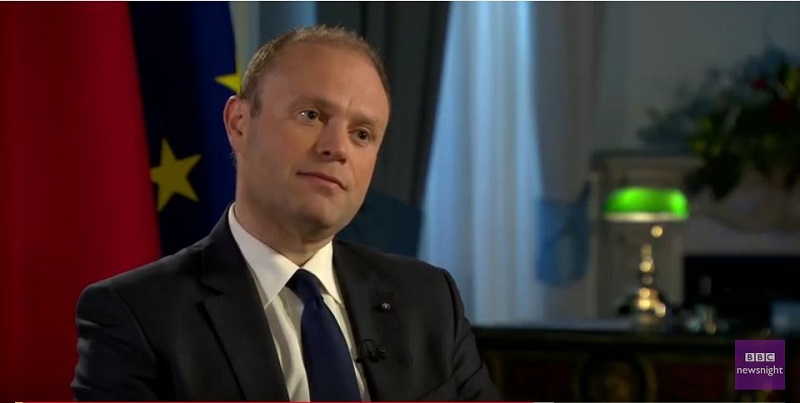Prime Minister Joseph Muscat was called the “artful dodger of Europe” when interviewed by BBC investigative journalist John Sweeney. Muscat dismissed the description calling it “preposterous” and saying it is being made because Malta’s “success story” is not going down well “with others”.
Watching the BBC’s feature was an unpleasant affair. This is a country – my home – whose most prominent investigative journalist was executed less than three months ago. While Muscat tried to spread a feel good factor and sideline all those opposed to his leadership as negative or outright traitors, the media is busy following Daphne Caruana Galizia’s beats.
The interview, aired on BBC’s Newsnight yesterday, was part of a feature marking the third-month anniversary of the assassination of Caruana Galizia and focused on allegations of high level corruption in Malta’s government ranks.
The Panama Papers revelations, the passport sales scheme, the allegations against Economy Minister Chris Cardona and allegations surrounding Pilatus Bank including the bank’s alleged links with the family of Azerbaijan President Ilham Aliyev, and the whistleblower’s account linking Egrant to Michelle Muscat, were all tackled in the interview.
Justice Shadow Minister Jason Azzopardi, former FIAU official Jonathan Ferris, MEP Roberta Metsola and blogger Manuel Delia were also interviewed, alongside Prime Minister Joseph Muscat.

Former FIAU official Jonathan Ferris being interviewed by John Sweeney of BBC Newsnight
The Economy Minister denied a request for an interview, although he made sure he denied the allegations against him. Minister Konrad Mizzi and the Prime Minister’s Chief of Staff Keith Schembri sent written statements to the Newsnight team.
The feature painted the top government team in a very dark light with the Prime Minister described as “passport seller in chief”. Sweeney said: “On Malta, the rule of law does not seem to bite on the Prime Minister and his clique”.
At the end of the feature, Sweeney poignantly asked about Caruana Galizia’s assassination: “Was it proof that she was onto something? Proof that someone powerful wanted that light switched off? Was it proof of Malta’s shame?”
In his statement, Mizzi reiterated his position that his Panama company “never traded or had a bank account” and said his interest was properly declared in “a ministerial declaration of interests in 2015”. The ministerial declaration of assets, dated February 2016, was tabled in parliament in April 2016, after Caruana Galizia broke the news of Mizzi’s interest in Panama company Hearnville Inc.
Schembri, on his part, says that the Panama company he owned was never used adding that “with hindsight, I realise that it was probably not the right call, purely based on the fact that perceptions matter as well”.
The FIAU repeated its position that the controversial dismissal of Jonathan Ferris was based on an objective performance assessment and was not politically motivated.
Muscat opened his interview with Sweeney saying that the effect of Caruana Galizia’s assassination on his standing had been “bad”, adding that “she was a very vociferous critic of many people” and the assassination “does not look very good on me”.
Muscat put himself in the second rank of persons suffering over Caruana Galizia’s assassination, right after the journalist’s family, saying that the assassination “cast a very long shadow on us”.

“One week after the assassination, where were you and what were you doing?” Sweeney then asked.
“I wouldn’t know, honestly,” Muscat said.
Sweeney swiftly reminded him: “You were in Dubai, selling passports for €650,000”.
“OK, all right,” Muscat said trying to laugh off the remark.
Muscat defended Malta’s passport sale scheme. “We don’t sell. We have, as other European jurisdictions, other European countries, systems by which, and programmes, and ours is the most transparent programme. People can invest in our country, can have residence, and even citizenship,” Muscat said, finishing off with a trademark salesman’s smile.
It felt like a well-rehearsed pitch made up of a series of meaningless marketing slogans.
Sweeney did not fall for Muscat’s sweet talk, “Who is buying these passports?” he asked. “Well, various people, wealthy people, and wealth doesn’t buy you the right to citizenship,” Muscat replied.
Attention then shifted to the relationship Muscat’s family has with that of the President of Azerbaijan. “Well, I met President Aliyev, erm, I believe twice in, erm, Baku, a number of times when we were at the EU, err, Eastern Partnership, mhm summits, erm, Mrs. Aliyeva, err, came here once, she met with my wife, that’s it. That’s the relationship”
“Nothing more?” Sweeney asked.
“Nothing more,” the Prime Minister confirmed.
Then Sweeney went on, saying, calmly, “Daphne said, there was a lot more…”.
Muscat laughed uncomfortably. “A million dollars,” Sweeney added.
“I don’t think you can hide a million dollars, I don’t think you can hide a hundred dollars,” Muscat replied, very visibly uncomfortable. He added, “definitely not in a bank, you know, definitely not anywhere else, you know”, still trying to keep his smile.
Sweeney then asked, “Does Malta have a problem with money laundering?”

BBC Newsnight’s John Sweeney
Muscat tried to strike a balanced reply: “I wouldn’t say ‘no, we do not have any problems’ or ‘yes, we do have problems’. I would say that we have as many problems as any other jurisdiction, be it the City of London, be it Luxembourg, be it The Netherlands when it comes to making sure that we, err, comply with the rules.”
Malta implemented the Fourth Anti-Money Laundering Directive last month, nearly six months after a 26 June deadline and only after the European Commission reportedly triggered infringement proceedings against Malta.
Muscat then goes on the offensive. “In any way I do not want to be seen, I know I am in a quite uncomfortable situation having to criticise someone who has been killed brutally, but, I hope we are not in a situation where in any democracy, erm, situations are such where if someone writes something on social media it’s taken as a fact.”
“But you’re doing exactly that aren’t you? She was killed brutally and you’re saying some of the time she was running gossip”, Sweeny hit back.
“Yes,” the Prime Minister replied.
Sweeney did not let that slip: “She had evidence, you don’t agree with, you don’t think it’s right, but she had evidence. She’s got a whistleblower.”
At this point Muscat lost the smile he wore for too long. “No, I totally disagree because I read exactly what she said. So, first of all, there isn’t a shred, not only of proof but of truth of what she said in all this.”
Caruana Galizia herself had reported that scans of the trust deed linking Muscat’s wife to Egrant had been passed on to magistrate Aaron Bugeja, who is leading an inquiry into the matter. Had there been no evidence, the magisterial inquiry that Muscat ordered soon after Caruana Galizia broke the news, should have been wrapped up in no time.
Muscat then questioned the credibility of whistleblower Maria Efimova, the former Pilatus Bank employee, at the heart of the story linking Michelle Muscat to Egrant, saying she was “a person calling herself a whistleblower” and describing her account as “dubious”.
Muscat reiterated his commitment that he would resign if there was any “whiff of evidence” and expressed doubt that he was not sure whether Caruana Galizia was “part of the invention” or simply fed a story that “looked too true, erm, too good to be true, let’s put it this way”.
Sweeney then countered: “The charge in a nutshell, is that you are the artful dodger of Europe”. A charge Muscat defined as “preposterous”.












